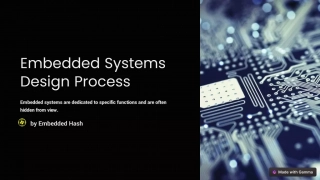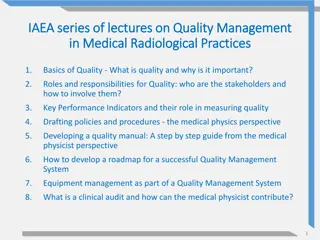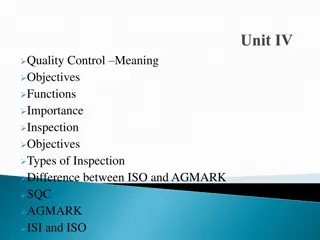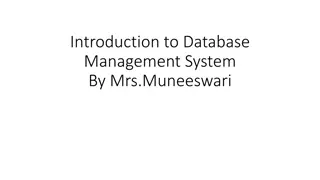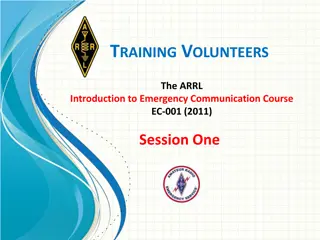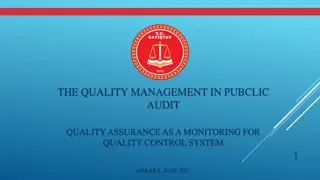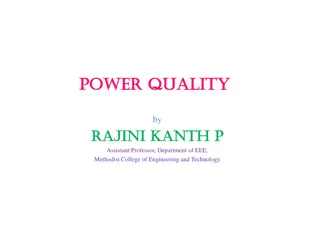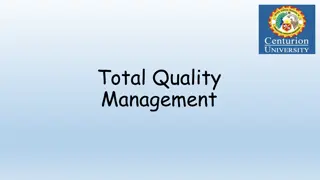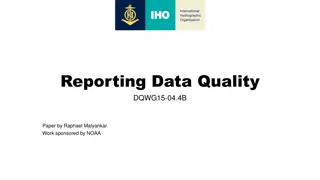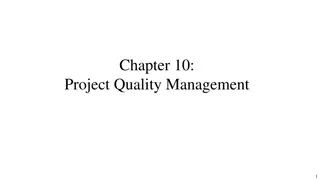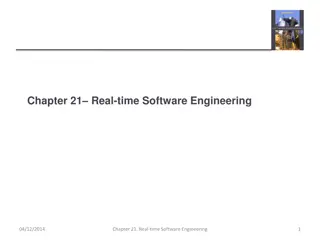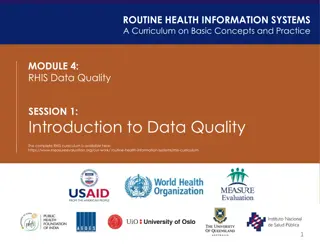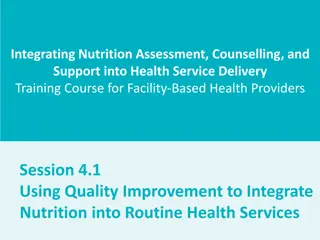Understanding Multimedia Systems: Hardware and Software Components
Multimedia systems require specific hardware and software components to meet the demands of producing and playing multimedia content. Development systems are used for creating content with higher specifications, while playback systems are used for playing multimedia files with lower specifications.
8 views • 46 slides
Embedded Systems Design Process in the Embedded systems
Embedded systems are all around us, from the tiny microcontrollers in our household appliances to the sophisticated control systems in cars and aeroplanes. But how are these systems designed? Let's delve into the basics of the embedded systems design process in simple terms that anyone can understan
2 views • 9 slides
Overview of Distributed Systems: Characteristics, Classification, Computation, Communication, and Fault Models
Characterizing Distributed Systems: Multiple autonomous computers with CPUs, memory, storage, and I/O paths, interconnected geographically, shared state, global invariants. Classifying Distributed Systems: Based on synchrony, communication medium, fault models like crash and Byzantine failures. Comp
9 views • 126 slides
Operating Systems
An operating system is a crucial program that manages all other programs on a computer. It handles tasks like input recognition, file management, and device control. There are different types of operating systems such as single-user, single-task systems, multi-user, multi-task systems, real-time ope
6 views • 11 slides
Understanding Information Systems in Organizational Management
Management in organizations is divided into three levels: operational, tactical, and strategic. Each level requires different information systems to support various activities. Operational systems focus on routine transactions and control processes, while middle-level systems aid in semi-structured
9 views • 39 slides
IAEA series of lectures on Quality Management in Medical Radiological Practices
Quality management in medical radiological practices is crucial for ensuring the delivery of high-quality healthcare services. This series of lectures covers topics such as the basics of quality, roles and responsibilities, key performance indicators, drafting policies, developing a quality manual,
4 views • 54 slides
Understanding Quality Control: Meaning, Objectives, Functions, and Importance
Quality control is a crucial process where management ensures products meet predetermined standards. It involves assessing quality, locating deviations, suggesting improvements, and reducing wastage. Inspection is essential for verifying product quality and quantity. Maintenance of quality, cost red
2 views • 14 slides
Introduction to Database Management System Explained
This presentation covers the basics of database management systems, including definitions of data, types of data, structured and unstructured data, storing data in computers using file systems and database systems, and issues with file systems like data redundancy, inconsistency, difficult data acce
1 views • 18 slides
Understanding Different Types of Recommender Systems
Recommender systems play a crucial role in providing personalized recommendations to users. This article delves into various types of recommender systems including Collaborative Filtering, Content-Based, Knowledge-Based, and Group Recommender Systems. Collaborative Filtering involves making predicti
0 views • 7 slides
Efficient Greenhouse Cooling Systems for Smart Agriculture
Active summer cooling systems like fan-and-pad and fog systems are crucial for maintaining optimal temperatures in greenhouses. These systems work by utilizing evaporation to remove heat from the air. Fan-and-pad cooling systems have been in use since 1954, where water is passed through pads to cool
1 views • 23 slides
Smart Antenna Systems Overview: Enhancing Wireless Performance
Smart antenna systems, like adaptive array antennas and switched beam antennas, combine antenna arrays with digital signal processing to transmit and receive signals adaptively. These systems improve signal quality, reduce interference, and increase capacity by dynamically adjusting radiation patter
0 views • 20 slides
Understanding Emergency Communication Systems for Volunteer Training
This content covers various topics related to emergency communication systems for volunteer training, including agency communication systems, government radio systems for police and fire departments, emergency medical radio systems, American Red Cross frequencies, and types of served-agency radio sy
2 views • 29 slides
Introduction to Embedded Systems Design
Embedded Systems Design, Chapter 1 provides an insightful overview of embedded systems, distinguishing them from general-purpose computers. The chapter delves into the characteristics of embedded systems, their design considerations, and the various types of embedded computers such as general-purpos
1 views • 7 slides
Study on Identifying Quality Measurement Indicators in Primary Dental Care
This study by Matthew Byrne, an Academic Clinical Fellow at the University of Manchester, focuses on identifying quality measurement indicators for primary dental care. The aims include gaining consensus on important quality dimensions, assessing available quality measures, and identifying areas for
1 views • 12 slides
Understanding Quality Assurance in Public Audit Systems
Quality assurance in public audit systems plays a crucial role in evaluating audit compliance, improving quality control processes, and detecting problem areas. It helps ensure effective operation and establishment of quality controls, supporting audit findings with proper evidence, disseminating go
1 views • 22 slides
Quality Program and Process in Manufactured Construction
The module explores quality management in manufactured construction, covering concepts, history, standards, control programs, defects, and more. Emphasizing the importance of quality in the construction process, it discusses the evolution of quality in manufacturing and its application in the manufa
0 views • 40 slides
Comprehensive Overview of Quality Control in Blood Bank and Quality Assurance
In this detailed content piece, we delve into the realms of quality control and assurance in blood banks, emphasizing the crucial aspects such as quality system essentials, internal and external quality control procedures, and the significance of quality assurance in ensuring products meet required
0 views • 46 slides
Understanding Power Quality and Its Impact on Electrical Systems
Power quality refers to the characteristics of electrical power that drives sensitive equipment. It involves voltage and current deviations from ideal waveforms, impacting the efficiency and reliability of electrical systems. Various types of power quality phenomena exist, such as voltage variations
1 views • 16 slides
Food Safety and Quality Management in the Food Industry
Food safety is a critical concern in the food industry due to frequent outbreaks and consumer uncertainty. To meet market needs and legal requirements, producers must adhere to specific standards and implement systems for managing quality and safety. Quality assurance systems like GAPs, GMPs, and HA
2 views • 12 slides
Sustainable Evaluation Systems Workshop Summary
Workshop on Sustainable Evaluation Systems by Stephen Porter at the NEC Conference focused on defining evaluation systems, addressing their failures, and emphasizing the importance of quality, use, and networks in achieving sustainability. Participants engaged in activities such as bingo card introd
0 views • 38 slides
Continuous Monitoring of Water Quality in Little Bear River
Explore the implementation of sensors, cyberinfrastructure, and continuous monitoring networks in the Little Bear River to improve water quality predictions. Discover the challenges and solutions related to designing monitoring networks, integrating optical measurements with water quality data, and
1 views • 38 slides
Understanding Quality of Life and Its Impact on Society
Quality of life is not just a concept but a way of living that influences our judgments, standards, and priorities. Quotes from notable figures emphasize the importance of setting high standards and valuing quality in all aspects of life. The discussion delves into different perspectives on quality
0 views • 16 slides
Enhancing Audit Quality and Impact with ISSAI 140
Importance of audit quality for credibility, stakeholder confidence, and overall impact. Objective of SAIs to implement quality management system like ISSAI 140. Steps to implement ISSAI 140, organizational requirements, risk assessment, governance, and leadership responsibilities. Overview of quali
0 views • 12 slides
The Importance of a Chief Quality Officer in Healthcare Trusts
The need for a Chief Quality Officer (CQO) in healthcare trusts in England is emphasized due to the complexities of managing quality, the significance of quality alongside finance, and the call for a new approach to address quality issues. The CQO plays a crucial role in overseeing and improving qua
0 views • 11 slides
Data Quality Reporting in Distribution Chain
Data Quality Reporting in the distribution chain is crucial for evaluating and ensuring the quality of exchanged data sets. This paper by Raphael Malyankar sponsored by NOAA discusses the importance of reporting data quality results, the stages in the production/distribution chain where reporting is
0 views • 15 slides
Information Systems in Organizations: Overview and Implementation
Information systems play a crucial role in organizations, encompassing transaction processing systems, functional area information systems, and enterprise resource planning systems. This content delves into the purpose of transaction processing systems, the support provided by information systems ac
0 views • 30 slides
Quality Measures in Healthcare: Maine Quality Forum Initiatives
Maine Quality Forum (MQF) collaborates with various healthcare stakeholders to provide comparative health care quality information to consumers, purchasers, providers, insurers, and policy makers. The forum focuses on reporting provider-specific quality measures, aligning with the Institute of Medic
0 views • 12 slides
Power Quality Monitoring and Evaluation in Modern Energy Systems
Power quality is crucial for stable operations in energy systems. This content discusses issues in power supply, reasons for measuring power quality, consequences of bad power quality, methods for measuring power quality, and evaluation techniques for compliance reports. Tracking power quality param
0 views • 21 slides
Understanding Cascade Control Systems in Industrial Processes
Cascade control systems play a crucial role in improving process control efficiency by incorporating feedback loops within feedback loops. This type of control architecture helps to better handle disturbances and variations in the process by creating secondary loops that monitor specific parameters.
0 views • 8 slides
Sustainable Education for Human and Environmental Systems
Sustainable Education for Human and Environmental Systems (SHES) focuses on fostering sustainable societies through social learning and systems thinking. It aims to promote interconnectedness between human and environmental systems, with a vision of enhancing well-being while maintaining the viabili
0 views • 19 slides
Importance of Quality Assurance Programmes in Population Censuses
Quality assurance programmes play a crucial role in ensuring the accuracy and reliability of census data. These programmes help in identifying and rectifying errors at various stages of the census process, ultimately leading to high-quality outcomes that are valuable for data users. Emphasizing on t
0 views • 26 slides
Leadership Engagement for Quality Transformation in Medical Device Companies
Move from a culture of compliance to quality by influencing CEOs and key leaders, prioritizing quality over cost, and engaging employees. The mission is to promote quality as a strategic priority through strong leadership and alignment. Strategies include identifying and rationalizing cultural pract
0 views • 9 slides
Understanding Embedded Systems and Cyber-Physical Systems
Embedded systems are specialized computer systems embedded within larger systems, such as control systems and car controllers. This lecture covers real-time aspects, applications of Cyber-Physical Systems (CPS), and examples like the Boeing 777/Airbus A380 cockpit. It discusses the design process of
0 views • 22 slides
Understanding Project Quality Management
Project Quality Management involves processes such as quality planning, assurance, and control to ensure that a project meets the relevant quality standards. It encompasses activities like identifying quality standards, evaluating project performance, and monitoring results to improve overall qualit
0 views • 65 slides
Understanding Real-time Software Engineering for Embedded Systems
Embedded systems play a crucial role in controlling various machines and processes. Real-time software engineering focuses on designing systems that respond instantly to events, ensuring correctness and timeliness. Characteristics like continuous operation, unpredictable environment interactions, an
0 views • 59 slides
Quality Assurance/Quality Control of Real-Time Oceanographic Data: Five-Year Plan Update 2022-2026
Update on the Quality Assurance/Quality Control plan for real-time oceanographic data, presented by Mark Bushnell at the US IOOS/QARTOD DMAC Annual Meeting in June 2022. The presentation covers the focus on real-time quality control manuals, the Seven Laws of QARTOD established in 2003, and the invo
0 views • 15 slides
Quality Control Labs for Life Project Training Overview
Explore the world of quality control labs for life project training, covering topics such as standardization, ISO requirements, quality management systems, technical aspects, examination processes, and factors affecting quality. Learn about ISO clauses, materials/data required, and the importance of
1 views • 14 slides
Understanding Data Quality in Routine Health Information Systems
Data quality in routine health information systems is crucial for accurate decision-making and planning. This module covers the conceptual framework, dimensions, and metrics of data quality, along with common threats and types of data quality problems. High-quality data enable accurate assessment of
0 views • 15 slides
Integrating Nutrition Assessment and Counseling: Quality Improvement in Health Services
This training course focuses on integrating nutrition assessment, counseling, and support into routine health services using quality improvement methods. Participants will learn to explain the concept of quality improvement, develop a plan for integrating nutrition services, and understand key princ
0 views • 32 slides
Mobilising for Quality Education: A Global Initiative for Ensuring Quality Teaching and Learning
Mobilising for Quality Education is an international initiative that emphasizes the importance of quality education for individual development and societal progress. The initiative focuses on three pillars of quality education: quality teaching, tools for teaching and learning, and environments for
0 views • 13 slides

